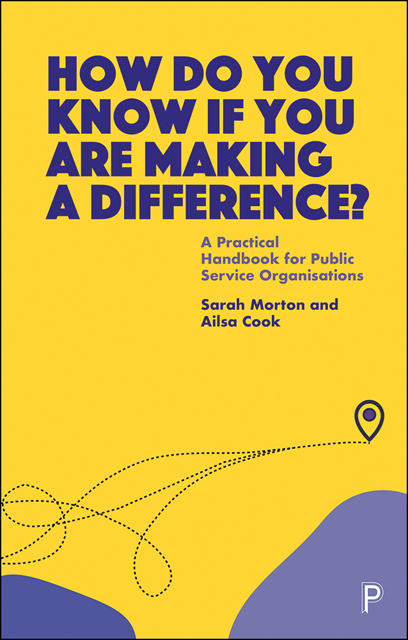 How Do You Know If You Are Making a Difference?
How Do You Know If You Are Making a Difference? Book contents
- Frontmatter
- Dedication
- Contents
- List of figures and tables
- Acknowledgements
- Preface
- 1 Why is it so hard to know if you are making a difference?
- 2 Why complexity thinking can help you understand public services
- 3 What data and evidence do you need to see what difference you are making?
- 4 Embrace the complex contex
- 5 Embrace the complex context
- 6 Clarify the change you want to see
- 7 Get going on your data, evidence and feedback improvement journey
- 8 Tracking progress towards outcomes and impacts
- 9 Telling the story of the difference your work makes
- 10 Using this approach in different contexts and sectors
- 11 Becoming an outcome- and impact-focused organisation
- References
- Index
1 - Why is it so hard to know if you are making a difference?
Published online by Cambridge University Press: 20 June 2023
- Frontmatter
- Dedication
- Contents
- List of figures and tables
- Acknowledgements
- Preface
- 1 Why is it so hard to know if you are making a difference?
- 2 Why complexity thinking can help you understand public services
- 3 What data and evidence do you need to see what difference you are making?
- 4 Embrace the complex contex
- 5 Embrace the complex context
- 6 Clarify the change you want to see
- 7 Get going on your data, evidence and feedback improvement journey
- 8 Tracking progress towards outcomes and impacts
- 9 Telling the story of the difference your work makes
- 10 Using this approach in different contexts and sectors
- 11 Becoming an outcome- and impact-focused organisation
- References
- Index
Summary
Do you really know if your organisation, project, programme, service or initiative is making a difference? And are you able to confidently share the story of the difference you’re making with funders, commissioners and other stakeholders? We suspect that if you are reading this book, the answers to these questions might not be as strong as you would like. You are not alone. This is an issue that has taxed governments, philanthropists, public service organisations big and small and evaluators all over the world for many years.
We engage with teams who strongly believe in the work they do and know implicitly that it does make a difference. However, when they need to report on the difference they’re making, they struggle to bring together and evidence a story that paints a realistic picture of their contribution to change.
If you work in public services in the public or third sector and this sounds familiar, then this book is for you.
This chapter explores why it is so hard to know if projects, programmes, partnerships and organisations are making a difference, and what is needed to go on the journey to be able to make evidenced claims that really demonstrate impact.
Specifically, this chapter covers:
• why it is so hard to know the difference you are making;
• the benefits of knowing the difference you are making;
• what you need to go on this journey; and
• our approach to understanding if you are making a difference.
By reading this chapter we hope you will understand why we are writing this book, and what we are going to cover in the rest of the chapters, including an orientation to where you might focus your reading, depending on what you want to know.
Why it is so hard to know the difference you are making
Traditionally, public service systems have been focused on activity and outputs, rather than process and outcomes. This flows into the data and evidence that are captured. There aren’t many well-developed and embedded ways of understanding the difference an initiative makes. Indeed, there is often disagreement about what is the right approach. As a result, organisations face different demands for different kinds of data, which makes it hard to commit to any one approach.
- Type
- Chapter
- Information
- How Do You Know If You Are Making a Difference?A Practical Handbook for Public Service Organisations, pp. 1 - 12Publisher: Bristol University PressPrint publication year: 2022
